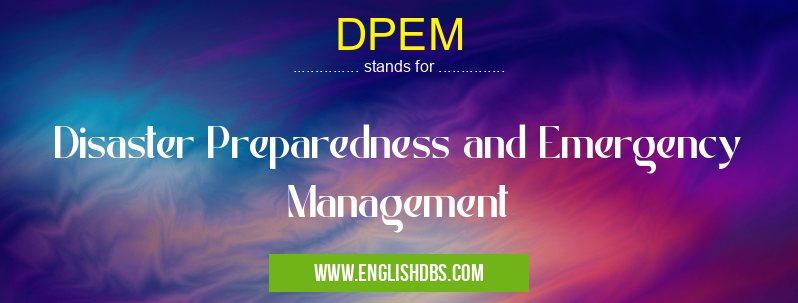What does DPEM mean in MANAGEMENT
Disaster preparedness and emergency management (DPEM) are the techniques and processes used by governments, organizations, and individuals to prepare for, respond to, and recover from emergencies and disasters. DPEM includes a variety of strategies that help ensure the safety of people, protect property and lives during natural disasters or other hazardous events.

DPEM meaning in Management in Business
DPEM mostly used in an acronym Management in Category Business that means Disaster Preparedness and Emergency Management
Shorthand: DPEM,
Full Form: Disaster Preparedness and Emergency Management
For more information of "Disaster Preparedness and Emergency Management", see the section below.
» Business » Management
Essential Questions and Answers on Disaster Preparedness and Emergency Management in "BUSINESS»MANAGEMENT"
What is the purpose of disaster preparedness?
The main purpose of disaster preparedness is to reduce the impact of disasters on vulnerable populations. This can be done by making sure that communities are aware of potential risks and hazards, developing plans for responding to different types of emergencies, preparing resources such as food and healthcare supplies, conducting drills and exercises so that responders can practice their responses in real-time scenarios, and creating a designated response team with members who have specific roles in a crisis situation.
How do you know when an emergency has occurred?
An emergency may be declared by authorities such as government agencies or local law enforcement when they determine that a situation presents an imminent threat to public health or safety. In this case, they will provide instructions on how people should respond in order to minimize any harm or loss. Emergency notifications will also typically be issued through various media outlets such as radio stations or online sources.
What should you do if you are caught in an emergency situation?
If you find yourself in an emergency situation it is important to stay calm and think clearly about what steps need to be taken for your safety. Depending on the circumstances you should either seek shelter or evacuate the area if instructed; follow guidance from first responders such as police officers or fire personnel; be aware of any local instructions issued by authorities via media outlets; pay attention to your surroundings; listen for updates regarding the status of the incident; avoid using personal electronic devices unless necessary; keep communication lines open with loved ones; have access to basic medical supplies where possible; limit physical contact with others, including shaking hands etc.; clean surfaces frequently; maintain good hygiene at all times.
What should I include in my emergency plan?
Your emergency plan should include details such as contact numbers for family members/friends; meeting points should evacuation become necessary; information about coping mechanisms such as meditation or yoga techniques during stressful situations; strategies for staying informed during an incident (such as signing up for alerts); information on local services available during crises (for example food banks); documents required in case of evacuation (driver's license etc.). It's also important to consider cultural needs — many Indigenous communities require specific protocols for evacuations which need to be included in your plan.
What actions can government organizations take towards Disaster Preparedness?
Government organizations can take initiatives like developing strategic plans around common threats faced within their jurisdiction, engaging stakeholders across multiple levels (local/state/federal), providing funds for research into new technologies aimed at assisting communities with disaster preparedness activities, creating award programs geared towards incentivising innovation in DPEM efforts among organizations within their jurisdiction/province/state etc., offering training courses related to areas such as search & rescue operations etc., developing public awareness campaigns advocating best practices amongst citizens etc..
Final Words:
Disaster preparedness is a critical component of public safety when it comes protecting communities from potential hazards associated with natural disasters or other hazardous events. Understanding the importance of having well-informed citizens who understand appropriate procedures before during and after an incident can help save lives during emergencies. Authorities must invest efforts into implementing effective DPEM measures aimed at helping citizens respond effectively to difficult situations while also ensuring adequate accommodations are provided whenever possible.
